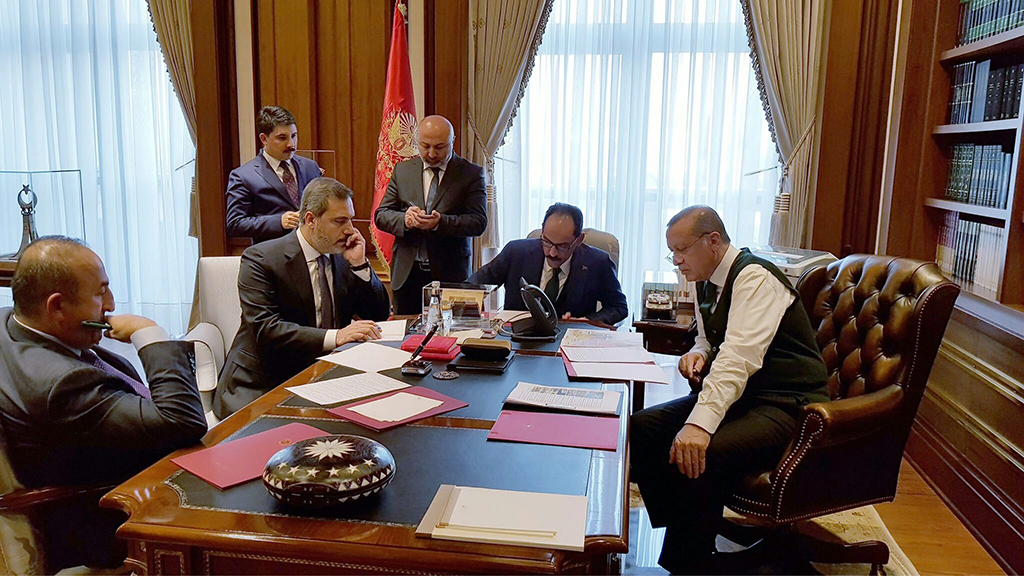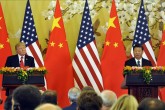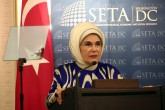President Recep Tayyip Erdoğan will be in New York this week to hold a large number of bilateral meetings and address the United Nations General Assembly. Provided that Erdoğan speaks right after U.S. President Donald Trump, it will be interesting to compare the two leaders’ remarks.
Of course, it is possible to make a comparison based on Erdoğan and Trump’s foreign policy performances without listening to their speeches first. The Turkish president will visit New York as the proud architect of the Idlib agreement that stopped a bloody regime offensive, which U.N. Secretary-General Antonio Guterres could do nothing about except express concern about the potential humanitarian tragedy. It was Erdoğan who did the necessary thing and persuaded Russian President Vladimir Putin. He prevented massive civilian casualties and the next Syrian refugee wave. At the same time, Turkey assumed a huge responsibility in the fight against terrorism by facilitating the establishment of a demilitarized zone – just as it had created pockets in Azaz, Jarablus and Afrin for Syrian civilians by targeting Daesh and the People’s Protection Units (YPG) militants. The country’s latest efforts proved yet again that it was genuinely committed to a solution in Syria at a time when the United Nations was helpless, and powerful nations, such as the United States, tried to undermine any solution.
Erdoğan will appear before the General Assembly with a higher level of self-confidence and legitimacy thanks to his most recent accomplishments and continue to criticize the United Nations system. His motto – “The world is bigger than five” –isn’t just a catchphrase. It represents an effort to uphold humanitarian values and to correct the unfairness of the international system. Turkey, which remains the world’s leading provider of humanitarian assistance, backs up its words with action. One thing is clear: The United Nations system, which victors of World War II designed, fails to promote a just order. Although the U.N. sees itself as a global organization seeking to promote justice, security, economic development and social equality, everybody seems to agree that it hasn’t been able to accomplish those goals. The Syrian crisis attests to that fact.
The United Nations was actually established to protect the interests of the five permanent members of the Security Council, i.e. the United States, Russia, China, the United Kingdom and France, and to create a balance of power among them. Although crippled by the power of the veto, the Security Council seems to protect the interests of its permanent members to some degree. Yet it’s hard to say that the same goes for the rest of humanity. This is why Erdoğan’s reform proposal seeks to defend the rights of all other nations. Even though countries like India, Japan and Germany are among the advocates of an overhaul of the United Nations system, Turkey’s Erdoğan has been the most vocal advocate of reform and openly criticized the U.S. administration and U.N. Security Council members.
With the Security Council unable to respond to major international crises, the Turkish president used the General Assembly to raise awareness around the world. In December 2017, he united the vast majority of member states against the Trump administration’s plan to change Jerusalem’s historical status despite Washington’s threat of economic sanctions.
By contrast, President Trump, who will address the U.N. General Assembly before the Turkish leader, has been busy trying to undermine the United Nations system that the United States created. He continues to cancel multilateral agreements, such as the Transatlantic Trade and Investment Partnership, the Paris Climate Agreement and the Iran nuclear deal, and to distrust international organizations including NATO and the World Trade Organization. In addition to strong-arming U.S. allies, i.e. the European Union, Germany and Turkey, into making concessions, Trump accuses China and the European Union of robbing the United States through unfair trade agreements. At the same time, the administration has been trying to withdraw from various U.N. bodies and forego its responsibilities. The U.N. Human Rights Council, UNESCO and the UNRWA immediately come to mind.
President Trump wants to redesign the international system based on U.S. interests alone – as his campaign motto, America First, suggested. By contrast, Turkey calls for a new international system that seeks to protect the interests of all countries and urges the United Nations to take necessary steps. In a nutshell, this is the difference between Erdoğan’s constructive approach and Trump’s destructiveness.
[Daily Sabah, 23 September 2018]
In this article
- Opinion
- Al Quds
- Antonio Guterres
- Britain
- China
- DAESH
- Daily Sabah
- Donald Trump
- Europe
- European Union (EU)
- Fight Against Terror
- France
- Germany
- HTS
- Human Rights
- Humanitarian Assistance
- Idlib
- India
- Iran Nuclear Deal | Joint Comprehensive Plan of Action (JCPOA)
- Islamic Republic of Iran
- Israel
- Jerusalem
- Middle East
- NATO
- Palestine
- Paris Climate Agreement
- People's Protection Units (YPG)
- PKK - YPG - SDF - PYD - YPJ - SDG - HBDH - HPG - KCK - PJAK - TAK - YBŞ
- Recep Tayyip Erdoğan
- Russia
- Sanctions
- Syria
- Syrian Civil War
- Syrian Conflict
- Syrian Crisis
- Terrorism
- The World Is Bigger Than Five
- Trump Administration
- Turkish President
- Türkiye's Republican People's Party (CHP)
- U.N.
- U.N. Reform
- UK
- UN Secretary General
- United Kingdom (UK)
- United Nations (UN)
- United Nations Educational Scientific and Cultural Organization (UNESCO)
- United Nations General Assembly (UNGA)
- United Nations Human Rights Council (UNHRC)
- United Nations Relief and Works Agency for Palestine Refugees (UNRWA)
- United Nations Security Council (UNSC)
- United States (US)
- US President
- Vladimir Putin



